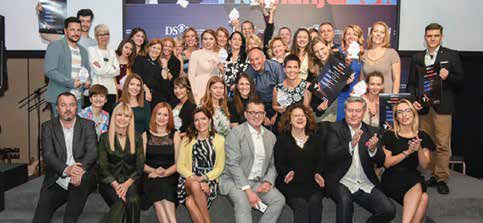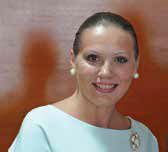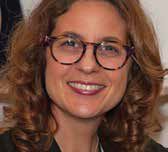We asked members of the Managing Board of the Serbian Public Relations Assocation (DSOJ) about the importance of self-regulation and the things that DSOJ advocates in their respective industry, namely from how to regulate professional standards to what changes await us in the communications segment.

1. Ethics Code, how important is it to set standards for communication professionals?
2. Everyone is working on the same mission, that is promoting the profession. What has changed when communication channels changed, and what does the technological revolution bring in terms of your profession?

MILICA DJOKIĆ, Member of DSOJ’s Managing Board: TRUTH IS MOST IMPORTANT
1. DSOJ’s Professional Ethics Code is a sort of reminder for all PR theorists and practitioners. Its goal is to develop and strengthen personal responsibility of all stakeholders involved in creating public opinion and the impact that our profession has on it. Since we are aware of the fact that each individual has become a medium unto themselves and that we are living in a time when everybody can disseminate their messages and opinions on social media easily or much easier than beofre, we insist that laws should be adhered to, that the messages we transmit should not offend nobody and that competition is respected. It is important to point out, and this is something that is often forgotten in practice, that PR managers, before transmitting information about their client or employer, have to check the accuracy of that message because truth is most important in our work. Once you break the trust, it is not easy and even downright impossible to restore it. The most important thing is to preserve the credibility of the profession and to point out that each member is responsible for the reputation of the profession.
2. My profession is a part of me and communication and interpesonal relations are my stronghold. I do my best to promote my profession through my behaviour and projects on a daily basis. The DSOJ website has all the important news from the field of communications and has become a relevant source of information for all interested stakeholders. The development of technology has led to PR, marketing and advertising consolidating in communications where these business segments cannot be viewed separately. Today, we communicate through more channels than 3 years ago, and this number is likely to continue to grow. This gives us more opportunity for quality campaigns and achieving customer satisfaction, but it also opens more potentially crisis situations. The times when a company or a client found out first about the crisis are long gone. Now, they don’t have a time to get all the relevant answers and hold a press conference to explain to the stakeholders and the general public what actually happened. Everything happens in real time; immediately and permanently. One of the characteristics
of our business is to react in a timely manner, so it is not surprising to see that the best professionals in our environment have re-surfaced and that only the best and the most resourceful will survive.

GORDANA BEKČIĆ PJEŠČIĆ, Member of DSOJ’s Managing Board: QUALITY MATTER
1. It is more important now then ever before. Generally speaking, I am afraid to say that the quality of knowledge, skills and opinions is declining in all segments – from political to cultural. And this is a global trend! In most sectors, communication is often taken for granted very easily, and many people start working in this field without a clear idea of what are all the potential challenges. If we want to be a reputable profession, the Association, as a national professional association, has to promote quality and point out to the examples of unprofessional
behaviour. Only by doing so can we clearly and publicly define which practices are destroying our profession’s and our individual reputation since our profession is a source of our income.
2. What is different is the situation where public relations do not exist in a form that they existed in the past.
Actually, we are talking about a trend here, not a situation. We are talking about a new reality. Technology dictates constant changes, new solutions and tools, which, in my understanding of things, can be dealt with only through integrated and continuous teamwork, in order to ensure quality and professional performance. Particular consideration should be given to intergenerational cooperation in the field of communication. The digital sphere of this business is certainly a good terrain for young colleagues from the Generation 4.0, but managing crisis and reputation requires experience and a broader perspective. This should be taken into account now, when online
reality is the dominant form of presentation of both people and companies.

MILA ZAVODJA, Member of DSOJ’s Managing Board: ADAPTING TO MARKET GROWTH
1. For years, the Serbian Public Relations Associations has been succeeding in gathering and motivating individuals
to invest additional effort toward jointly advancing their profession. Changes are happening fast, and our profession has had a lot of novelties that had to be accepted. One of the things that is a constant and
without which our profession could not survive is respecting the rules of conduct contained in the Professional Ethics Code. We are here to fight against everything that violates the rules of the profession, but also to support all positive examples that elevate our profession. The responsibility of all of us, as professionals, is to be
more active in the promotion of the profession and to support those colleagues who ‘push the envelope’. Only in this way we will be able to distance ourselves from those who are damaging our profession’s reputation with their behaviour.
2. For a number of years, PR professionals have wanted their profession to become highly specialized and clearly delineated from other, similar areas. Now, these borders have completely disappeared. There is no clear delineation
anymore and all of us are responsible for acquiring new skills on a regular basis so that we can fulfill our clients’ requirements. There has been a huge U-turn in the way how we create and promote content – i.e. having personalized content when I want it and where I expect it to be in the future. It is up to us to fully understand
this and adapt our work to market demands. I am confident that many of my colleagues in Serbia are already implementing these trends in their work.